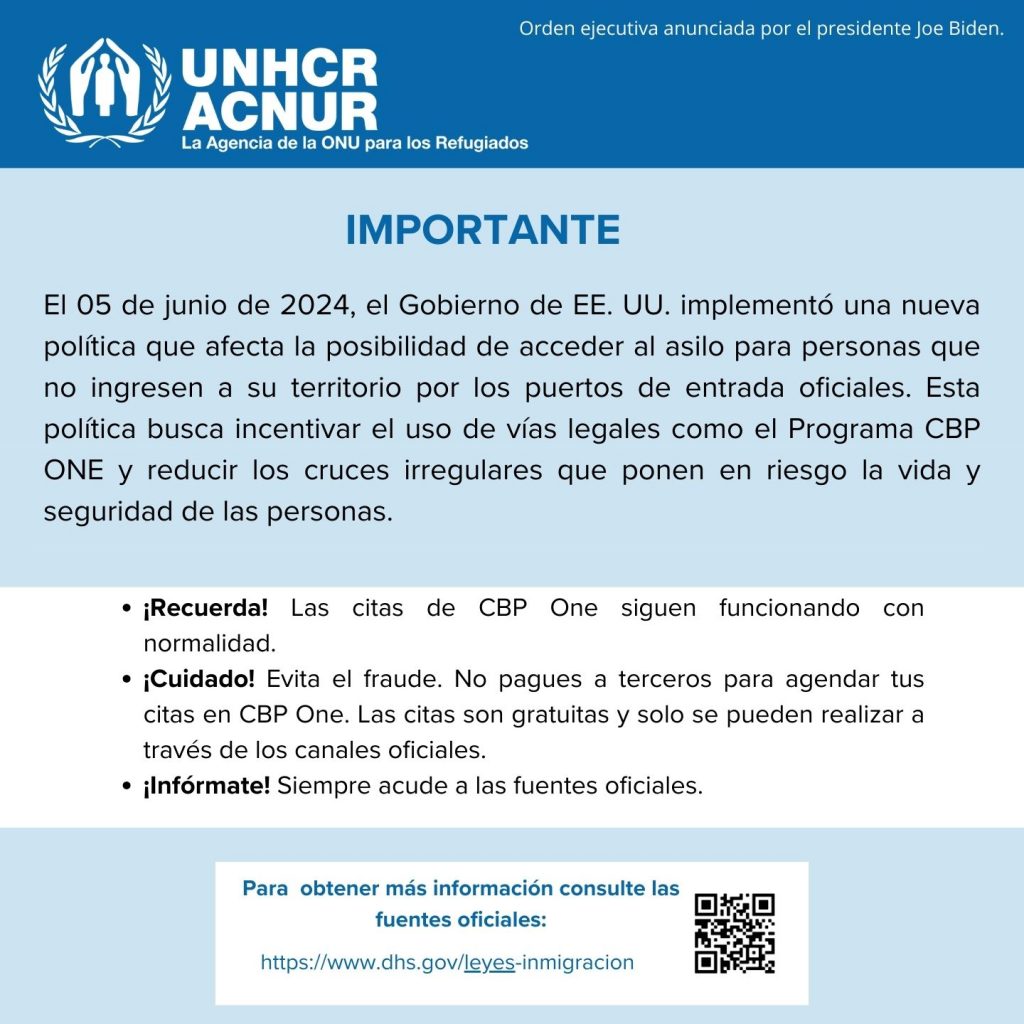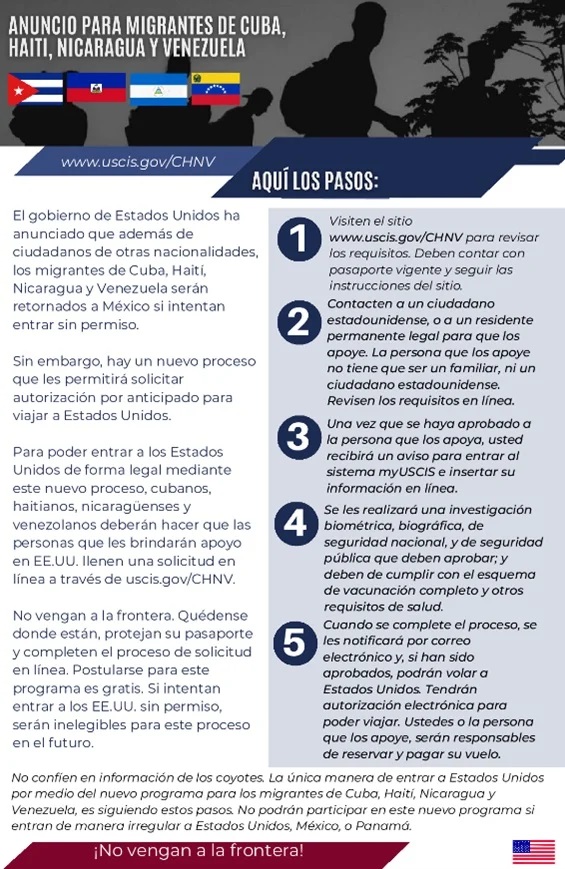
U.S. Government Announcement, June 2024


Please note that these messages do not represent an official position of UNHCR. Their objective is to provide clear and accurate information to refugees and migrants so that they can make informed decisions together with their families.
If you have additional questions, please visit the U.S. government’s website: Processes for Cubans, Haitians, Nicaraguans and Venezuelans | USCIS
The U.S. government decreed, effective immediately, that nationals from Cuba, Haiti, Nicaragua and Venezuela who irregularly cross the southern border of the U.S. or who cross the Darien (Colombia-Panama border) and arrive in Mexico in an irregular manner will be expelled from the U.S. to Mexico and will not be eligible for this new process to enter the United States.
This measure went into effect:

What is the process to enter the United States?
The U.S. government announced the process for nationals of Cuba, Haiti, Nicaragua and Venezuela and their immediate family members to apply for entry into the United States in a safe and orderly manner. The process is now in effect and the U.S.-Mexico border is closed to persons of the described nationalities if they do not comply with the steps for coordinated entry.
The U.S. government will provide travel authorization for 30,000 people to enter the United States each month through the temporary stay permit process for Cubans, Haitians, Nicaraguans and Venezuelans. This allows for a consistency of operations and arrivals of people seeking a temporary stay.
Note that the measure implies that, with immediate effect, persons of Cuban, Haitian, Nicaraguan and Venezuelan nationality who irregularly cross the southern border of the U.S or who cross the Darien (Colombia-Panama border) and arrive in Mexico irregularly will be deported to Mexico and will not be eligible for this process.
What are the requirements to participate?
As an applicant you must have a “supporter” in the U.S, i.e. a person who can provide financial support during your stay in the U.S. The “support person” may also be a representative of a legal firm or other organization or entity.
The “support person” must be a U.S. national or have regular U.S. immigration status (Residency, citizenship, work permit, asylum, TPS, DED or any other immigration status of regular stay), and financial means to provide financial support.
The supporter will also have to pass security checks.
To participate, you must meet the following requirements:
In what situations can a person not apply to the process?
What are the steps to apply for participation?
My passport is expired. Do I need to apply for an extension or will my expired passport be accepted?
Yes, each person in the process will need a current and valid passport to travel to the U.S. by air.
In the case of Venezuelan nationals, according to the information published by the U.S. government, please see this additional information about passport validity:
Can minors travel without a passport, only with the passport of their parents or guardians?
People under 18 years of age traveling with their parents or guardians must have their own passport and cannot be included in the passport of a parent or guardian.
For more information, please refer to the following links:
Processes for Cubans, Haitians, Nicaraguans and Venezuelans | USCIS
Now that Title 42 has been lifted, please note that the border is not open and there will be no free passage for those seeking to enter the country irregularly. Stay informed and make informed decisions about the procedures and policies implemented by the United States before travelling.
Border authorities may apply different forms of prosecution to people trying to enter irregularly, including immediate deportation to Mexico or the country of origin, with a ban on entry for at least 5 years; with the possibility of facing criminal charges.
If you irregularly cross into the United States or present yourself at a port of entry without a CBP One App citation, border authorities may apply any of the Title 8 processing modalities.
Through this immigration policy, individuals who present themselves at the U.S. border and do not have a legal pathway to do so will not be eligible to apply for asylum in the United States.
Likewise, the Transit Bar will apply to non-Mexican nationals crossing through a country where they could have applied for asylum and did not, or who applied for asylum and have not received a determination or have not been denied. In these cases, application for asylum in the United States could potentially be denied.
These immigration policies also apply to families with children.
Exceptions exist for individuals who are authorized to travel to the United States under a parole program or those who present an actual inability to register through the CBP One application.
It is necessary to be within U.S. territory and seek legal advice to initiate the process.
For those in Mexico, you must request an appointment through the CBP One application and show up on the day of their appointment at a port of entry to express your intention to apply for asylum to the authorities.
Remember that the CBP One appointment does not constitute a request for asylum in the United States, but rather allows formal entry into the country, subject to the approval of its authorities.